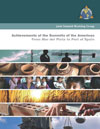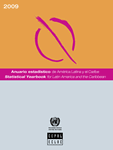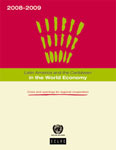|
|
|
Joint Summit Working Group (JSWG) |

|
|
|
LINKS
|
|
PUBLICATIONS
|
|
|
|
Publications by the OAS and Members of the Joint Summit Working Group. Please click on the year above to see all publications related to that particular year.
|
|
|
|
|
|
 This report presents the efforts of the twelve institutional partners of the Joint Summit Working
Group (JSWG) to implement and support the commitments adopted by the Heads of State and
Government at the Fourth Summit of the Americas held in Mar del Plata, Argentina in November
2005. In addition, this volume provides a brief overview of strategies
and actions that can contribute to the implementation of the commitments being made in
the framework of the Fifth Summit of the Americas in Port of Spain, Trinidad & Tobago in April
2009.
This report presents the efforts of the twelve institutional partners of the Joint Summit Working
Group (JSWG) to implement and support the commitments adopted by the Heads of State and
Government at the Fourth Summit of the Americas held in Mar del Plata, Argentina in November
2005. In addition, this volume provides a brief overview of strategies
and actions that can contribute to the implementation of the commitments being made in
the framework of the Fifth Summit of the Americas in Port of Spain, Trinidad & Tobago in April
2009.
Read more... |
|
|
|
|
|
|
|
 Read more...
Read more... |
|
|
|
|
|
|
|
 Read more...
Read more... |
|
|
|
|
|
|
|
 This Migration Profile of Brazil was produced by IOM´s Research Unit, in coordination with IOM offices in the region. The preparation of the Profile was possible thanks to the close collaboration with Brazilian government agencies involved with migration management.
This Migration Profile of Brazil was produced by IOM´s Research Unit, in coordination with IOM offices in the region. The preparation of the Profile was possible thanks to the close collaboration with Brazilian government agencies involved with migration management.
The Migration Profile of Brazil shows that the country has historically been recognized as a destination country for immigrants. At the end of the 1930s, around 4.4 million immigrants lived in Brazil, most of them comers from Portugal, Italy, Japan and Germany. Nevertheless, the Profile underlines that this flow was reversed in the last years. Since the 1980s, a new phenomenon could be detected in the dynamics of this society: the emigration of Brazilian citizens abroad. It has been estimated that a number ranging from 2,5 to 4 millions of Brazilian nationals live outside their country of origin, mainly in the United States, Paraguay, Japan, the United Kingdom and Portugal.
Read more... |
|
|
|
|
|
|
|
 The current global economic crisis is impacting migration patterns and processes around the world. A reduction in migration flows globally has been reported, and in particular declines in irregular migration flows have been observed in some regions. The World Bank has reported a slowdown in the rate of increase of remittances on a global level, although with important regional variations. There are regular reports from around the world of migrant workers being laid off, and while some migrant workers are apparently returning home, others are choosing to stay. How to respond to these migration impacts poses a number of challenges for policymakers in both countries of origin and destination.
The current global economic crisis is impacting migration patterns and processes around the world. A reduction in migration flows globally has been reported, and in particular declines in irregular migration flows have been observed in some regions. The World Bank has reported a slowdown in the rate of increase of remittances on a global level, although with important regional variations. There are regular reports from around the world of migrant workers being laid off, and while some migrant workers are apparently returning home, others are choosing to stay. How to respond to these migration impacts poses a number of challenges for policymakers in both countries of origin and destination.
This report considers the lessons for migration policy to be learned from the five major financial crises of the 20th Century, namely the Great Depression of the 1930s, the Oil Crisis of 1973, the Asian financial crisis of 1997-99, the financial crisis in Russia at the end of 1998, and the Latin American financial crisis of 1998-2002. This report draws out the wider lessons for policy that can be learned from previous responses to economic crises.
Read more... |
|
|
|
|
|
© Summits of the Americas
|
|
|
|





